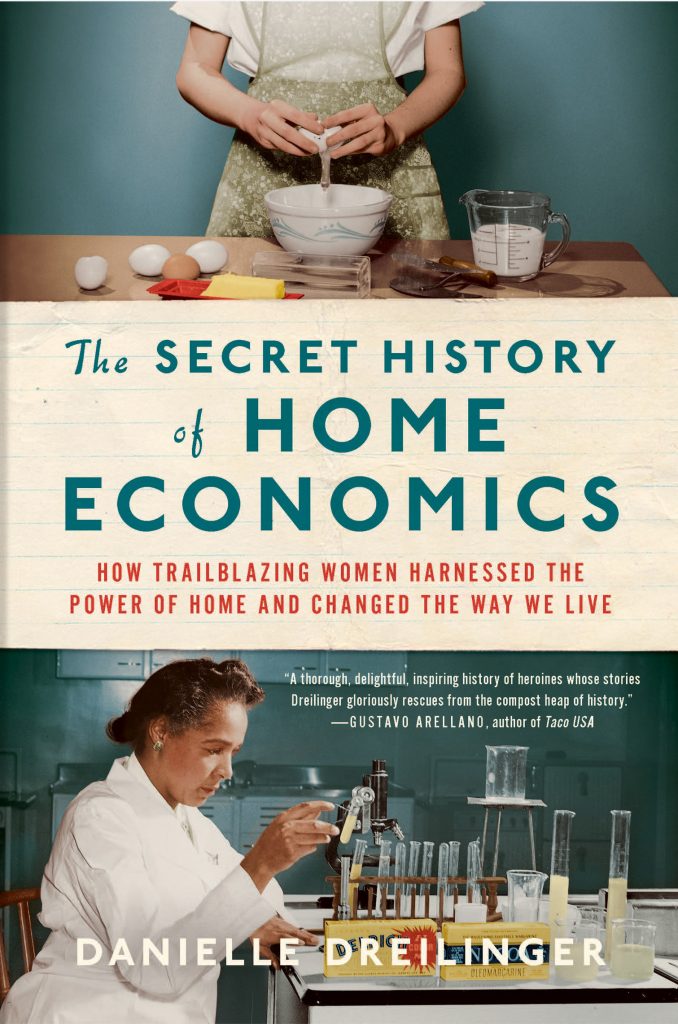By Terri Schlichenmeyer
You’ve had a lot on your plate this past year.
Lock-downs, virtual classes, and stay-at-home orders weren’t all bad, though; the hunker-down was an opportunity for a new hobby. Knitting busied your fingers. Reading engaged your mind. Newly-discovered baking skills literally added to your plate and, as in “The Secret History of Home Economics” by Danielle Dreilinger, Great-Grandma would be proud.
Our nation wasn’t but a few decades old when it became very clear that some citizens were lacking resources, to the point of “disadvantage.” Women, for example, were generally solely in charge of the home and everything about it, and that often made for a hard life.
 By the 1870s, though, help was coming: Ellen Swallow, a “country girl” with an astounding drive to learn insisted on studying the growing new field of science. She then made it her life’s work to use what she’d learned to better the lives of women.
By the 1870s, though, help was coming: Ellen Swallow, a “country girl” with an astounding drive to learn insisted on studying the growing new field of science. She then made it her life’s work to use what she’d learned to better the lives of women.
Margaret Murray Washington saw the same need, but in a different way: born just before the Civil War ended, she knew that Black women likely already possessed housekeeping skills and needed no further instruction there. Washington, wife of Booker T., instead pushed for the creation of “domestic science” classes at Tuskegee, believing that a formal degree would ensure racial equality.
The idea of domestic science (or “home economics,” as it was later called) was not without detractors but ultimately, emphasis was placed on science and economics. Women learned efficiency in daily chores, but they also learned ways to save money and fix everything from clothing to appliances; food safety, gardening, sanitizing, and healthy cooking.
NDG 5/27: New report shows number of people killed by police skyrocketed in 2020
Professional home economists reached out to women to enhance communities. Women reached out to county professionals for tips during peacetime and war.
NDG 5/20: ‘Shop Talk’ building a relationship between communities and those who protect them
By the 1970s, feminism swept across the country and home-ec “seemed practically to break loose from a corset.” It became clear that such things weren’t just for women; still, by the end of the decade, home ec was becoming more quaint than quintessential.
Says Dreilinger, it’s high time we bring it back.
There’s one important thing you’ll fully understand after you’ve read “The Secret History of Home Economics”: our foremothers were not to be trifled with. They were watchful, highly desirous of education, progressive, ingenious, and humble about their ignorance. In short, as author Danielle Dreilinger shows, Great Grandma was fierce.
NDG 5/13: Frustration continues to rise in the case of Marvin Scott, III’s death
Home Ec, as it turns out, wasn’t originally just the homey, cooking-sewing-baby-care classes like those you had in high school. Adult women, both professionals and everyday housewives, fought hard to gain opportunities for all homemakers and to turn the job into one with esteem. Those warriors came from surprising corners to do that, and how they did it is a story complete with embedded racism, Eleanor Roosevelt, two women who were “essentially married to each other,” and practice-babies.
Readers of women’s history will love this book, as will general historians, feminists, and anyone with an interest in domestic arts. There’s still work to do, so find “The Secret History of Home Economics” and dish it up.




